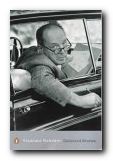a critical examination of Nabokov’s collected stories
It is possible that ‘A Letter that Never Reached Russia’ (January 1925) was a fragment of a novel, Happiness, which later became Mary, but it is given the coherence of a story by the unity of its themes.
 A young man is writing to a young woman he left behind eight years before in St Petersburg. He evokes their past together but then stops himself and declares that it is the present, his life of exile in Berlin, of which he wishes to speak. He then describes his happiness in the perception of the everyday details of life: ‘I get such a blissful, melancholy sensation when, late at night, its wheels screeching around the bend, a tram hurtles past, empty’ (DS,p.84). These moments of aesthetic pleasure – rather like the Proustian or Woolfian ‘moment’ – are provoked by very ordinary objects and phenomena: the gurgling of water in pipes or the combination of light and texture as a girl with an umbrella walks under a lamp and ‘a single taught, black segment of her umbrella reddens damply’ (p.84).
A young man is writing to a young woman he left behind eight years before in St Petersburg. He evokes their past together but then stops himself and declares that it is the present, his life of exile in Berlin, of which he wishes to speak. He then describes his happiness in the perception of the everyday details of life: ‘I get such a blissful, melancholy sensation when, late at night, its wheels screeching around the bend, a tram hurtles past, empty’ (DS,p.84). These moments of aesthetic pleasure – rather like the Proustian or Woolfian ‘moment’ – are provoked by very ordinary objects and phenomena: the gurgling of water in pipes or the combination of light and texture as a girl with an umbrella walks under a lamp and ‘a single taught, black segment of her umbrella reddens damply’ (p.84).
But then the main themes emerge: how to respond to exile, and the affirmation of the will to happiness in the fight of Life against Death. These are evoked when he mentions a visit to the Russian orthodox cemetery where an old lady has committed suicide on the grave of her recently deceased husband. She has collapsed into grief (as Sleptsov threatened to do) whereas the letter writer remains stubbornly happy, and his reaction is a challenge to the forces of obliteration, loss, and death:
centuries will roll by…everything will pass, but…my happiness will remain, in the moist reflection of a streetlamp…in everything with which God so generously surrounds human loneliness (p.87).
This is a very positive response to the fact of exile and the recognition of death’s inevitability, and the letter is in a sense written as much to Russia itself as to the girl he left behind there. It is one of the many stories Nabokov would write in which Russia and a woman are brought into symbolic parallel with each other – culminating in his masterpiece ‘Spring in Fialta’.
The story was also historically significant at the time in that it struck a blow against the orthodox notion in the Soviet press that life for all exiles was a ‘sterile and bitter purgatory’. Even under the most difficult circumstances Nabokov seems to have had what Brian Boyd calls ‘a genius for personal happiness’, and he transmits this very convincingly in his work.
As far as the development of his literary style is concerned, its significance lies in its being one further exercise in exploiting the possibilities of the first person narrative mode – a strategy he was to develop extensively in the stories and the novels which followed.
© Roy Johnson 2001
![]() Vladimir Nabokov: The Collected Stories – Amazon UK
Vladimir Nabokov: The Collected Stories – Amazon UK
![]() Vladimir Nabokov: The Collected Stories – Amazon US
Vladimir Nabokov: The Collected Stories – Amazon US
Vladimir Nabokov web links
Vladimir Nabokov greatest works
Vladimir Nabokov criticism
Vladimir Nabokov life and works